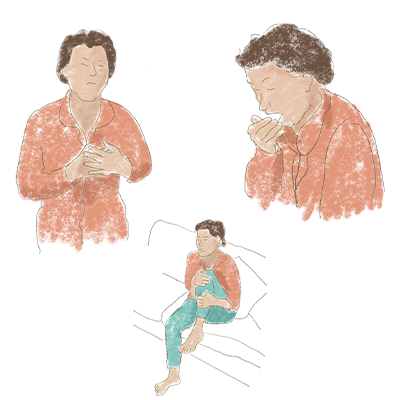Determining whether your symptoms are caused by your systemic mastocytosis (SM) can be difficult for you.1
Some people with SM have recognised that certain aspects of everyday life can trigger their symptoms.1,2
Symptoms can be frightening for you and your loved ones. It can help to learn what your triggers might be, as this could help you to avoid them where possible.
Every person with SM is unique, so one person’s triggers may not be another’s. Recognising your own triggers, and seeking medical attention when necessary, can improve the quality of life in living with SM.
Common triggers include, but are not limited to, the following:1,3
It may not be easy to identify your specific triggers but doing so could help you to avoid them.1,4
Speak to your doctor about any concerns you might have and for advice on how to avoid your triggers.
A complication is an unwanted result of a disease. Complications of SM may include:4–6
Anaphylactic reaction,
which is a severe and potentially life-threatening allergic reaction. People experiencing an anaphylactic reaction may have a rapid heartbeat, feel faint, or lose consciousness. If you have a severe allergic reaction, you may need an injection of epinephrine
Blood disorders,
such as having too few red blood cells or difficulty with blood clotting
Peptic ulcer disorder,
which leads to open sores and bleeding in your stomach or intestines
Loss of bone density,
which can make your bones weaker and more likely to break
Organ failure,
due to the mast cells building up in organs, causing them to swell and not function properly
It is important to be aware of the possible complications as your doctor will be monitoring you for signs of these complications. Ask your doctor any questions or concerns you have about possible complications.
SM may affect several different parts of the body.4,6 In order to manage the range of symptoms, a team of healthcare professionals specialised in different areas may be involved in your care.4,6 This is called a multidisciplinary team.
Some of the doctors that might be involved in your healthcare team could include:7–9
Allergist/Immunologist –
who has special training in diagnosing and treating allergies and other immune disorders10Gastroenterologist –
who has special training in diagnosing and treating disorders of the digestive system11Dermatologist –
who has special training in diagnosing and treating skin conditions12Haematologist –
who has special training in diagnosing and treating blood disorders13Oncologist –
who has special training in diagnosing and treating cancer14Management of your SM will also depend on the type of SM you have, as well as your affected organs and specific symptoms.4,6,9
As well as avoiding your triggers, your doctor will prescribe appropriate medicines to manage your SM. The types of medicines include, but are not limited to:
Medicines to carry with you in case of emergencies,
like self-injectable epinephrine to be administered in case of severe anaphylactic episodes
Preventative medicines,
such as anti-histamines, which aim to block histamine that causes allergy symptoms
STEROIDS AND ANTI-INFLAMMATORY DRUGS
to reduce inflammation
Targeted therapies
called tyrosine kinase inhibitors that may reduce the number of mast cells in your body
Speak to your doctor about any questions or concerns you have. Your doctor will be able to discuss these options with you and recommend the best management approach for your need.

